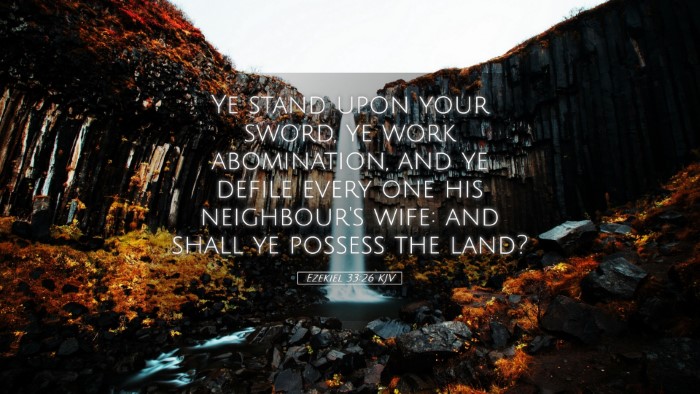Ezekiel 33:26 Commentary
Verse Context: Ezekiel 33:26 states, "You rely on your sword, you do detestable things, and each of you defiles his neighbor's wife. Should you then possess the land?" This segment falls within a broader prophetic warning concerning the consequences of sin and the reliance on human strength rather than the sovereignty of God.
Overview of the Passage
This verse must be understood in the context of the prophet Ezekiel’s mission to warn the people of Israel about their moral and spiritual failures. Here, the reliance on violence and immorality is criticized, serving as a strong admonition against trusting in mere human instruments of power and vice.
Insights from Public Domain Commentaries
Matthew Henry's Commentary
Matthew Henry offers a rich theological insight in his commentary on this verse. He emphasizes the following points:
- The Futility of Human Strength: Henry highlights that the reliance on a sword symbolizes a failure to trust in God. The sword, while a tool of power, cannot secure divine favor or the blessing of the land.
- Immorality Among the People: The mention of detestable acts and the defilement of neighbors signifies a deep moral decay within society. Henry stresses that sin not only corrupts individuals but also jeopardizes the community as a whole.
- The Conditional Nature of Possessing the Land: Possession of the land is conditioned upon moral integrity and alignment with God's covenant. Henry asserts that divine blessings are reserved for those who uphold righteousness.
Albert Barnes' Notes on the Bible
Albert Barnes provides a detailed analysis, drawing out several key themes:
- The Disconnection Between Faith and Action: Barnes notes that while the Israelites expressed faith in their God, their actions betrayed a reliance on violence and immoral practices, leading to a disconnection between their professed beliefs and their real conduct.
- Judgment for Sin: The judgment that comes against the people is not merely punitive but corrective. Barnes indicates that God’s discipline is aimed at bringing the people back to righteousness.
- The Reality of Divine Justice: Barnes asserts that divine justice must prevail. The Israelites cannot expect to gain the land while simultaneously engaging in sins that provoke God's wrath.
Adam Clarke's Commentary
Adam Clarke emphasizes a prophetic perspective in his interpretation:
- The Corruption of Leadership: Clarke observes that the failure of spiritual leaders to guide the people resulted in widespread moral failure. He argues that a nation’s sin reflects its leadership’s integrity.
- Consequences of Defilement: The specific reference to defiling one’s neighbor’s wife serves as a stark example of social corruption that challenges the very fabric of community. Clarke connects this to the broader implications of societal judgment.
- The Call to Repentance: Ultimately, Clarke calls for repentance, noting that even in judgment, God’s desire is for His people to return, seek reconciliation, and experience His mercy.
Theological Implications
This verse invites deep theological reflection and pastoral application:
- Trust in God Over Human Power: The tension between reliance on human strength versus faith in God's sovereignty continues to be relevant in contemporary Christian practice.
- Community Morality: The moral standards of individuals significantly impact the greater community. This passage challenges pastors to address not just individual sin but collective morality.
- The Nature of Divine Justice: Understanding God's justice as both punitive and restorative empowers believers to view trials as potential opportunities for spiritual growth.
- Call for National Repentance: In a broader socio-political context, this verse serves as a reminder that nations, like individuals, are accountable before God for their actions.
Conclusion
Ezekiel 33:26 speaks profoundly to the issues of moral integrity, reliance on God, and the nature of divine justice. By synthesizing insights from respected commentaries, we find a rich landscape for understanding these themes, encouraging pastors, students, theologians, and Bible scholars alike to engage with the text in both personal and communal reflection.


